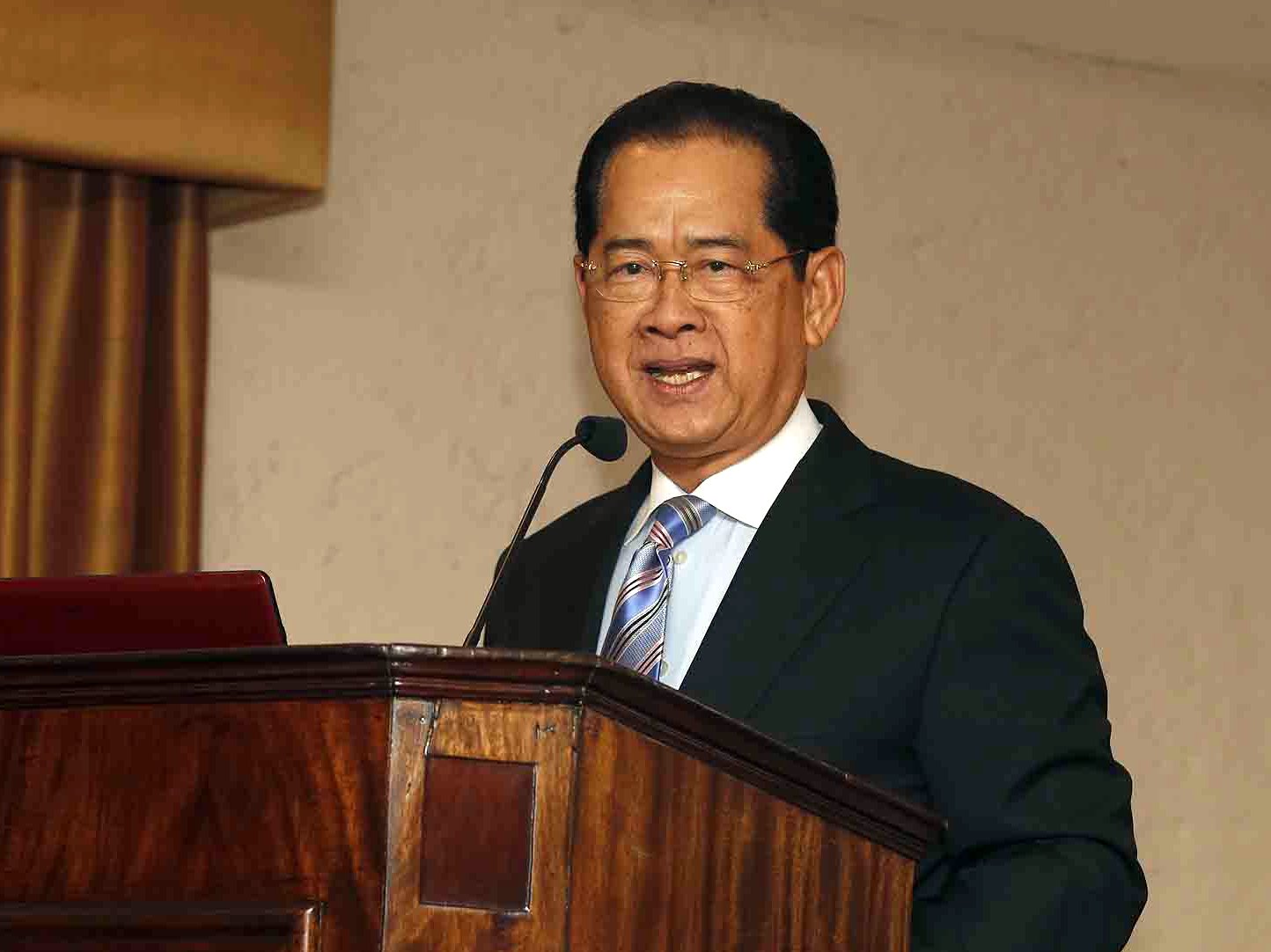
The Chile Pacific Foundation, which hosts the Chile committee for PECC, held its annual breakfast meeting on March 27th, in the presence of over 150 business and policy leaders. Dr. Narongchai Akrasanee, Chair of the Thai committee for PECC, was invited to speak on Thai and Southeast Asian development and international relations within the broader context of the Asia-Pacific. In his remarks Dr. Narongchai emphasized the role that Southeast Asian development has played in helping to bring about a Pacific Century.
[Photo 1: Dr. Narongchai Akrasanee, Chair of TNCPEC]
Chile has been a pioneer in bringing South American economies into the broader Asia Pacific. Chile joined PECC in 1991 and subsequently APEC in 1994 as the first South American member. The Chile Pacific Foundation (Fundación del Pacífico) was created in 1994 to promote the interests of Chile’s private and public sector actors by engaging with other economies in the Asia-Pacific and to serve as Chile’s secretariat for PECC, ABAC (APEC Business Advisory Council), as well as the APEC Study Center for Chile. It celebrates 20th anniversary in November this year. In addition, it plays policy advisory role to the Chilean government in respect to APEC, Pacific Alliance, FEALAC (Forum for East Asia-Latin America Cooperation) and other regional forums. In 2005, along with Singapore, New Zealand, and Brunei, Chile was one of the four original signatories of the Trans-Pacific Strategic Economic Partnership Agreement (TPSEP) or ‘P4’ that has since evolved to TPP (Trans-Pacific Partnership) involving twelve negotiating partners including the US and Japan. Today, as much as 60 percent of Chile’s export is delivered to the Asia-Pacific economies while 51 percent of its imports come from the region.
In his speech, Dr. Narongchai acknowledged that we are now indeed living a Pacific Century and that there are promising signs that this phenomenon is likely to continue for some time. For one, he noted that that there does seem to be satisfactory progress in economic rebalancing, which was one of the key challenges facing the region until recently. Before the financial crisis that erupted in the US marked by the 2008 collapse of the Lehman Brothers, the imbalance meant huge deficit in the US and equally huge surplus amassing elsewhere, particularly in East Asia. Subsequently, unconventional monetary policies adopted by the US since then contributed to high growth and imports into East Asia, eventually reducing the surplus. Secondly, under the leadership of Shinzo Abe, Japan has been taking bold measures with aggressive fiscal and monetary policies to revive its economy since 2013, contributing to reversing deflation, keeping the yen in control, and spurring exports. Thirdly, China has announced another major economic reform starting 2014 geared towards more liberalized economic and financial policies. This is positive for the region, considering that structural adjustments are expected to keep China’s exceptional growth rate of recent years in check, while giving way to other economies in the region to boost their production and economic activities, leading to further rebalancing.
The ASEAN economies are an important player in terms of the production supply chain and provision of foods and natural resources for the Asia-Pacific. Other members of the Asia-Pacific, namely, Australia, New Zealand, Chile, and Peru are resource-rich with advanced knowhow in managing these natural resources. Korea, Chinese Taipei and Hong Kong are small yet proving highly advanced in innovation and creative industries. Mature economies with strong institutions such as the US, Canada, and Japan serve to offer useful lessons for emerging economies as good or bad examples. With different strengths and comparative advantages pulled in together, Asia-Pacific economies have much to gain from one another.
Dr. Narongchai highlighted that there has been good economic progress in Southeast Asia overall since the 1997-1998 financial crisis. Several factors have contributed to this. In the 1990s, Cambodia, Laos, Myanmar, and Vietnam have adopted market-driven economic system, and have joined the ASEAN as new members. This has resulted in opening up new markets and providing additional trade and investment opportunities for the neighboring ASEAN economies as well as other trade partners. Thereafter, ASEAN has set an ambitious target of achieving an ASEAN Economic Community by 2015 which promises to bring significant improvement in institutional, physical and people-to-people connectivity within the region. As China joined the WTO in 2001, Southeast Asian economies benefited further by gaining access to a huge market that previously had been restrictive. Another more recent factor was during the 2008-2009 financial crisis when Southeast Asian economies were able to utilize US dollars at lower rates that helped to reinvigorate various economic activities in the region.
Dr. Narongchai also warned that there are risks ahead such as increased protectionism especially in the natural resource sector. Myanmar, undergoing fast socio-economic changes since politically opening up three years ago towards building democracy and connecting with the international community, needs to carefully manage the reduction of military control over its parliament and government. Thailand, as the natural hub and gateway to ASEAN, is also faced with the task of having to manage the delicate balance between bureaucratism/militarism democracy on the one hand and capitalist-driven populism democracy on the other, in its move towards eventually achieving democracy with accountability. He emphasized that ASEAN, and Indonesia in particular, can play a constructive role in ensuring balance among the great powers’ interests in the region.
During his visit to Santiago, Dr. Narongchai also spoke separately before a class of the Chilean Diplomatic Academy.

[Photo 2: (from left to right) Mr. Alberto van Klaveren (Chilean agent to the The Hague International Court of Justice and former Under Secretary of Foreign Relations), Dr. Narongchai Akrasanee, Mr. Eduardo Frei (former President of the Republic) and Mr. Francisco Silva (chairman of the Chile Pacific Foundation)]
Mr. Kanit Si, Executive VP of the Bangkok Bank, also addressed the annual meeting of CHILPEC with a presentation on bilateral business opportunities. On the following day, he co-chaired the first meeting of the newly established Thai-Chile Business Commitee at Sociedad de Fomento Fabril, Sofofa, the main trade association of Chile.


